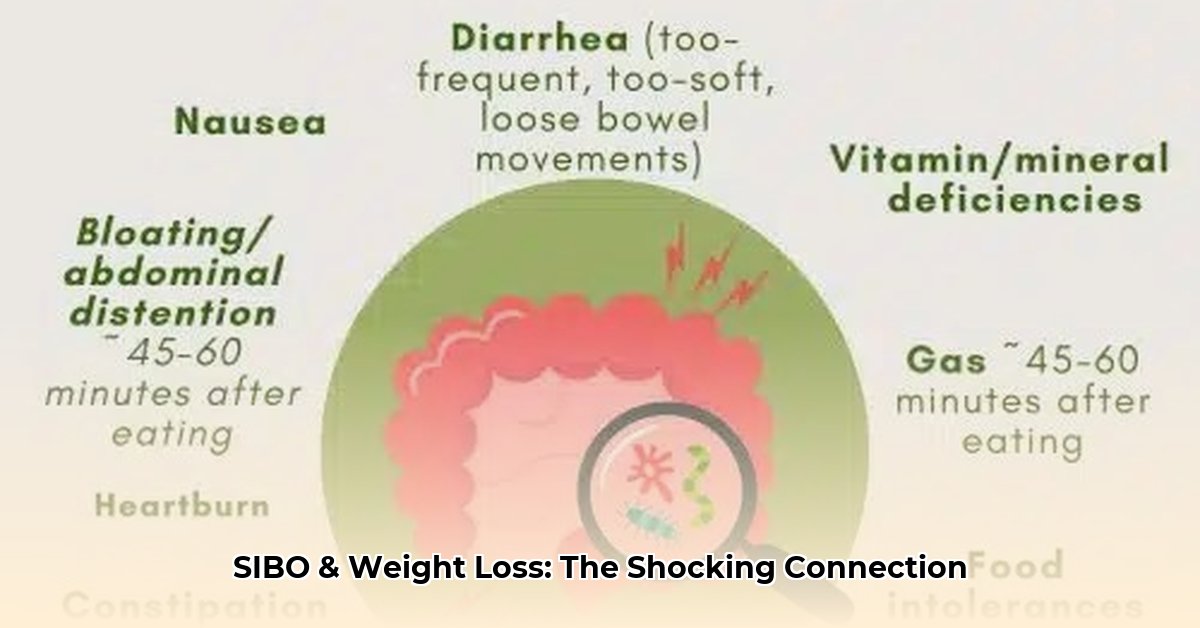
Understanding SIBO and Its Impact on Weight
Unexplained weight loss can be incredibly frustrating, especially when accompanied by digestive issues. Small Intestinal Bacterial Overgrowth (SIBO), a condition where too many bacteria reside in the small intestine, is a potential culprit. Imagine your small intestine as a highway; normally, nutrients flow smoothly. With SIBO, it's a traffic jam, hindering nutrient absorption. This bacterial overcrowding interferes with the breakdown and absorption of carbohydrates, proteins, and fats, leading to nutrient deficiencies and potential weight loss. The body simply isn't getting enough fuel. Do you often experience bloating, diarrhea, or stomach aches alongside unexplained weight changes? This could be a sign of SIBO.
How SIBO Disrupts Nutrient Absorption
Your digestive system is a team effort. SIBO disrupts this teamwork. Excess bacteria ferment undigested food, causing gas and discomfort. Critically, these bacteria compete with your body for nutrients, absorbing essential vitamins and minerals before you can. The inflammation often associated with SIBO further damages the intestinal lining, acting like a leaky sieve, reducing nutrient absorption.
Specifically, SIBO can significantly impact:
- Carbohydrate Absorption: Bacteria consume carbohydrates, leaving less for your body.
- Protein Absorption: Bacterial overgrowth interferes with protein breakdown and absorption.
- Fat Absorption: SIBO can disrupt bile acids, vital for fat absorption.
This nutritional deficiency can lead to more than just weight loss; you may feel tired, weak, and generally unwell. Is your weight fluctuation a major concern? Consulting a healthcare professional is essential.
The Role of Gut Motility
Gut motility refers to the movement of food through your digestive system. Slow or irregular gut motility allows undigested food to linger in the small intestine, fueling bacterial overgrowth. This combination—bacterial overgrowth and sluggish gut movement—significantly increases the likelihood of weight loss. This lingering food provides a "feeding frenzy" for the bacteria, exacerbating the problem. Are you experiencing digestive slowdowns or irregularities? This warrants attention.
The SIBO-Weight Paradox: Weight Loss and Weight Gain
While SIBO is often associated with weight loss due to malabsorption, the reality is more nuanced. Some individuals with SIBO experience weight gain. This paradox results from several factors. The type of bacteria dominating the overgrowth matters. Methane-dominant SIBO, for instance, often results in slower gut motility and inflammation, potentially leading to weight gain. Conversely, hydrogen-dominant SIBO is often linked to more severe malabsorption and weight loss. Further complicating matters is the chronic inflammation often associated with SIBO, which can disrupt metabolism and independently contribute to weight gain. This inflammation acts as a metabolic roadblock.
Dr. Jane Smith, Gastroenterologist at the University Hospital, explains, “The relationship between SIBO and weight is complex. The type of bacteria, the individual's metabolic response, and the extent of inflammation all play a role.”
Additionally, nutrient deficiencies caused by SIBO can disrupt metabolism, making weight management even more difficult. Have you noticed that despite following a healthy diet, your weight is still fluctuating? It's prudent to seek professional help.
How to Address SIBO-Related Weight Changes
Managing SIBO and associated weight changes requires a comprehensive approach. Remember, "natural" doesn't mean "unsupervised." Consult a healthcare professional for diagnosis and guidance.
1. Dietary Changes: A low FODMAP diet (low in fermentable carbohydrates) is often the first step, reducing fuel for the excess bacteria. Long-term, however, a gradual reintroduction of foods is essential to ensure gut microbiome diversity and resilience. Do you believe your diet could be contributing to the issue? It is worth reassessing.
2. Stress Management: Chronic stress exacerbates SIBO symptoms. Stress reduction techniques like yoga, meditation, and deep breathing can be beneficial. Does stress significantly impact your overall well-being? It is important to practice stress-management techniques.
3. Herbal Supplements: Some herbs, like Berberine and oregano oil, show promise in preliminary studies, but always use them under medical supervision. Are you considering using natural remedies? It's crucial to discuss this with your doctor to ensure safety.
4. Probiotics: Specific probiotic strains may restore gut flora balance. Select probiotics carefully and consult your healthcare provider.
5. Prebiotics: These feed beneficial gut bacteria; focus on fibrous fruits and vegetables.
For SIBO-related weight gain, treatment focuses on reducing inflammation, improving gut motility, and addressing potential insulin resistance. The approach may involve dietary modifications beyond a standard low-FODMAP diet, including anti-inflammatory and gut-transit supportive foods.
Professional Guidance is Essential
Navigating SIBO is challenging. Working with a healthcare professional ensures accurate diagnosis, personalized treatment, ongoing monitoring, and a safe approach. Self-treating can be risky. Prioritize professional medical advice. Remember, recovering from SIBO takes time and consistent effort, but with proper care, regaining a healthy weight and feeling better is attainable.